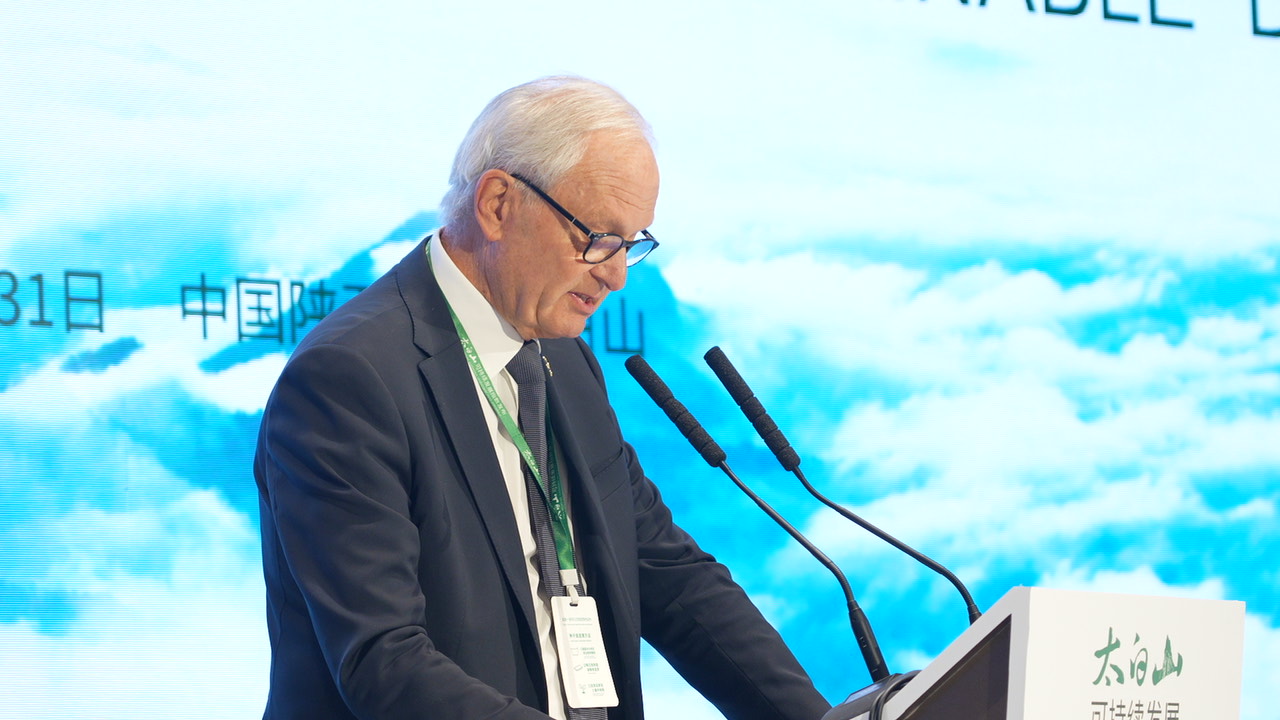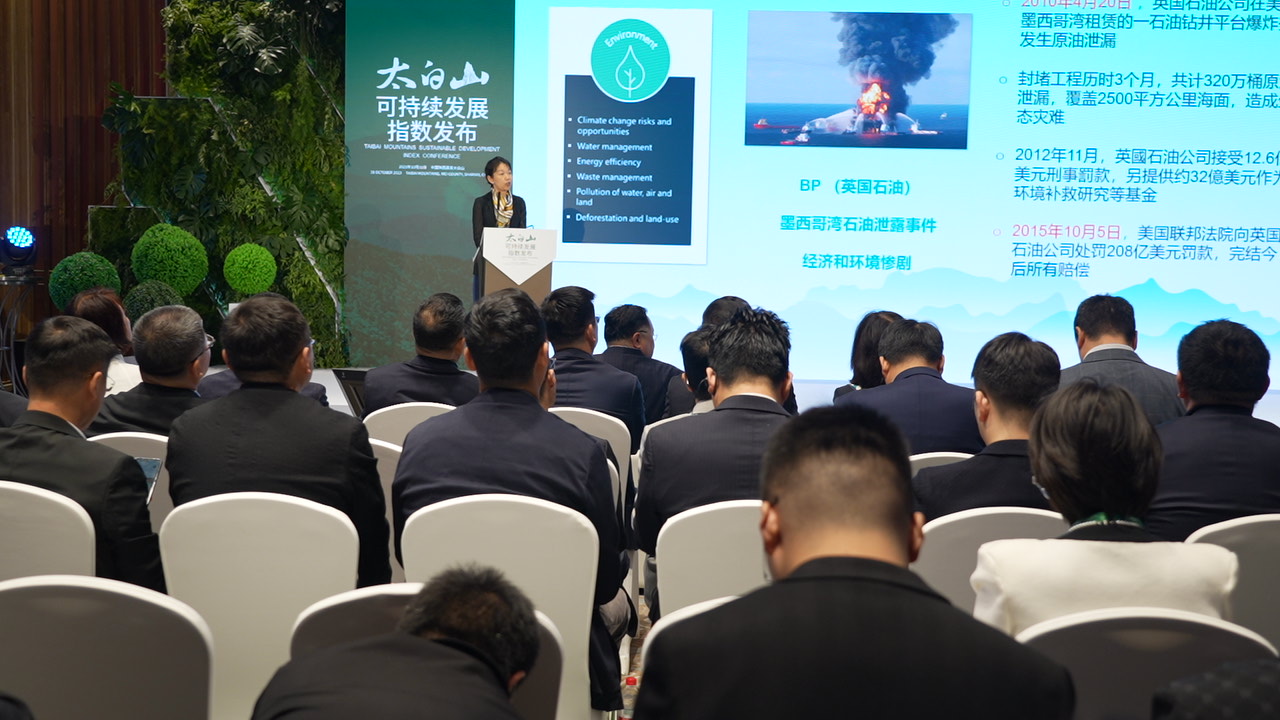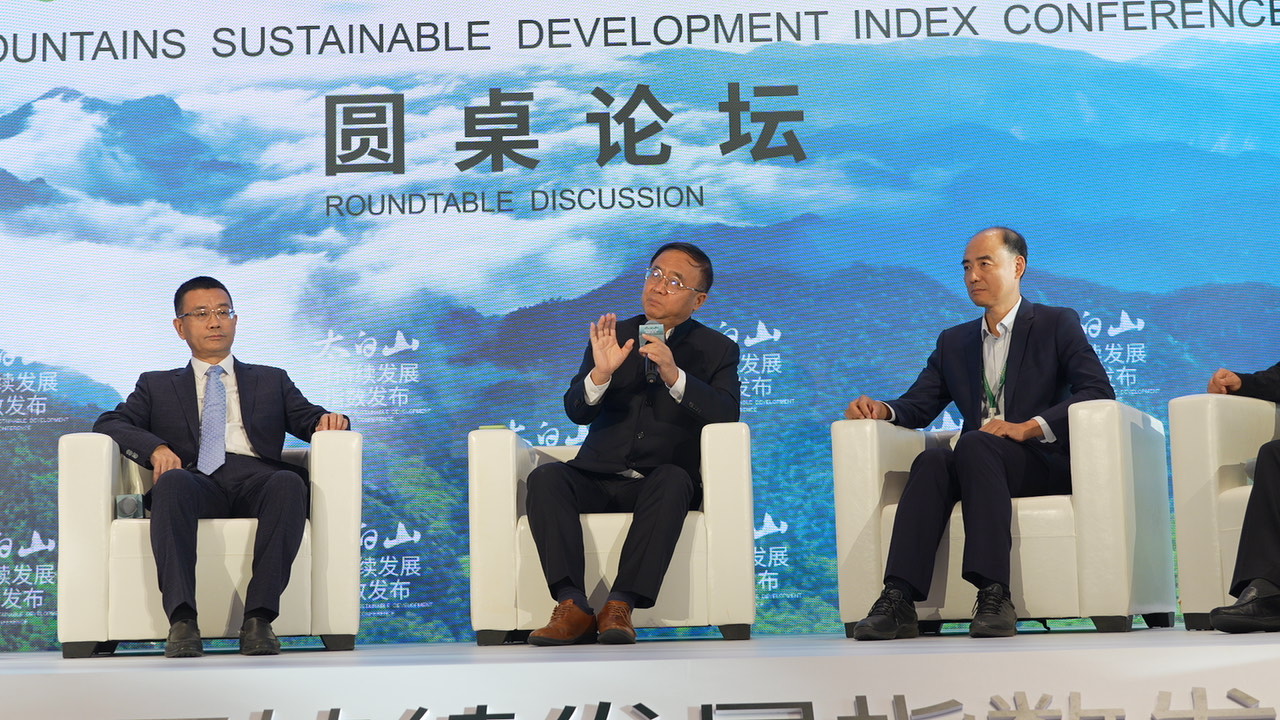2023-11-05
WSSO
The Taibai Mountain Sustainable Development Index was launched, marking a new milestone in global carbon reduction efforts. The event highlighted Taibai Mountain’s ecological preservation and announced the Global Carbon Infrastructure Alliance to support sustainable growth.
On October 31, 2023, the Taibai Mountains Sustainable Development Index Launch Conference was successfully held in the Taibai Mountains Tourist Area, Meixian County, Shaanxi Province. This event was guided by the Baoji Municipal People's Government, Meixian County Party Committee, Meixian County People's Government, and Shaanxi Taibai Mountains Tourism Area Management Committee. It was co-organized by Sun Media Group, the Institute for Global Common Development of Tsinghua University, the Institute of Global Industry of Tsinghua University, and Shaanxi Taibai Mountain Tourism Development Co., Ltd. Many experts, scholars, and business guests delivered keynote speeches on themes such as "Building a Green Future Together and Leading Sustainable Development," covering topics such as establishing global carbon standards, the current state of low-carbon sustainable development in Chinese enterprises and promoting the transition to low-carbon sustainable development.
Yang Lan, a well-known media personality and Chairman of Sun Media Group, presided over the event. She elaborated on the theme of "Building a Green Future Together, Leading Sustainable Development," expressing that sustainable development is humanity's hope in addressing the climate crisis. Peter Nobel, Chairman of the Nobel Sustainability Trust, praised China's significant, positive, and constructive role in global climate governance over the past decade. He emphasized that China's green and low-carbon sustainable development path helps realize synergies across economic, social, energy, and environmental sectors, inspiring innovation, fostering new industries, and creating jobs. China's experience proves that climate action does not hinder economic growth; instead, it promotes sustainable development and social stability.

Dr. Wu Zheng, Director General of the World Sustainability Standards Organization (WSSO), stressed that carbon standards are fundamental to achieving sustainable development. He highlighted that without global carbon standards, carbon footprint accounting, cross-border pricing, and cross-border carbon trading and settlement would be impossible. He noted that China and other developing countries must enhance their voice in the process of formulating carbon standards. The mission of WSSO is to promote the establishment of global carbon standards, including building consensus, creating standards, establishing credible digital carbon chains, and fostering cooperation on carbon infrastructure under equal rules.
Zhang Jie, Vice Chairman and Secretary-General of the Energy Investment Professional Committee of the China Investment Association, reviewed the background of Zero-Carbon China. He analyzed energy structures, the growth of renewable energy, and the replacement of fossil fuels under the overall goals of carbon reduction and achieving zero carbon. He proposed a six-character policy: "Retreat from coal, reduce oil, and cut carbon," and from a consumption scenario perspective, emphasized the importance of building standards and systems for zero-carbon cities.
Sustainable Development in Its Infancy: Addressing Challenges with Innovative Practices
Wu Ying, Founder and CEO of Prestige and Fortune Fintech (Beijing) Co. Ltd., explained the compilation of the Low-Carbon Sustainable Development Index for Chinese Listed Companies (A-shares) and the Top 100 List of Low-Carbon Sustainable Development of Chinese Listed Companies (A-shares). This report, based on research on 1,628 A-share listed companies, shows that only 7% of companies (114) achieved an A rating or higher. China's enterprises are still in the early stages of promoting and implementing low-carbon sustainable development transformation.

Notably, Chinese companies have demonstrated a strong consensus and innovative spirit regarding sustainable development. At the launch event, corporate leaders such as He Qing, Chairman of Beiben Heavy-Duty Truck Group Co., Ltd.; Zhang Xucheng, Chairman of Sun New Energy Development Co., Ltd.; Qiao Jian, Senior Vice President, Chief Strategy Officer, and Chief Marketing Officer of Lenovo Group; Yin Yuhui, Deputy Secretary of the Party Committee of Jiangxi Financial Holding Group; Liu Huanming, Vice President of BYD Group; and Chen Pengfei, President of the Chinese Government and Enterprise Business Unit of Longi Group, elaborated on their respective company's innovations and transformation in green transportation, clean energy development, ESG innovation, and green finance, which received wide recognition from the attendees.
In recent years, the promotion and implementation of sustainable development by various sectors of Chinese society have driven innovation in social governance. Wang Shi, Founder of Vanke Group and Chairman of Vanke Foundation; Liu Ke, Foreign Academician of the Australian Academy of Engineering and Dean of the Innovation and Entrepreneurship Institute of the Southern University of Science and Technology; and Ma Jun, Director of the Public Environment Research Center (IPE) and Founder of Blue Map, shared their thoughts and actions on promoting sustainable development in their respective fields. This has drawn broader attention to sustainable development in China and provided valuable practical cases of China's contribution to global sustainable development.

Building Consensus and Promoting Standards: The Launch of the "Global Carbon Infrastructure Alliance"
At the launch of the Taibai Mountains Sustainable Development Index, the World Sustainability Standards Organization (WSSO), the Central Bank Digital Currency Cooperation Organization (CBDCCO), and the Nobel Sustainability Trust (NST) jointly announced the establishment of the "Global Carbon Infrastructure Alliance" and invited global organizations, institutions, and enterprises to join the alliance.
In recent years, fragmented and decentralized investments by countries around the world have not fully realized the value of carbon reduction. The need for carbon infrastructure construction, which focuses on the gathering and circulation of carbon-related elements, has arisen. The key to solving the issue of carbon infrastructure lies in recognizing carbon as a fundamental element and unit of measurement for future development. The initiative revolves around seven key characteristics of "carbon infrastructure": digitalization, greenness, intelligence, public nature, platformization, fundamentality, and asset nature.
At the event, the World Sustainability Standards Organization and the China Investment Association Energy Investment Professional Committee signed a strategic cooperation agreement to promote the establishment of global carbon standards and carbon infrastructure cooperation.
Focusing on Taibai Mountains: A New Label for "Sustainable Development"
During the conference, Taibai Mountains, the host location, attracted the attention of numerous experts, scholars, policymakers, corporate representatives, and non-governmental organizations in the field of sustainable development. With the Taibai Mountains Sustainable Development Index Launch, Taibai Mountains Tourist Area officially introduced its new label of "Sustainable Development."
Taibai Mountains, the main peak of the Qinling Mountain Range, is a national 5A-level tourist attraction, a national-level tourist resort, a national key scenic spot, a national nature reserve, a national forest park, and a famous Taoist cultural site. Benefiting from years of active ecological protection and cultural excavation efforts, Taibai Mountain's rich natural ecological resources and historical cultural heritage provide a solid foundation for sustainable development. In recent years, Taibai Mountains have actively explored resource recycling and green energy initiatives.
Striking a balance between development and protection, the Taibai Mountains Tourism Area Management Committee has enacted and enforced regulations to maintain tourism order, protect visitors' rights, and promote tourism industry development. They also focus on the development of local communities by providing training and employment opportunities, promoting specialty agricultural products and industries, and helping local residents improve their living standards.
Zhang Xinlin, Director of the Shaanxi Taibai Mountains Tourism Area Management Committee, stated that the Taibai Mountains Sustainable Development Index Launch will become a high-end platform focusing on sustainable development, promoting innovative thinking, and fostering international cooperation. Taking advantage of the event, Taibai Mountain Tourism Area will accelerate the development of an integrated model of "tourism + ecology + hot springs + wellness + culture," leveraging its unique hot spring resources, ecological environment, and convenient transportation to plan international medical rehabilitation centers, immersive performance centers, sports centers, forest-themed amusement parks, and other cultural and tourism commercial projects. These projects will further enhance the tourist area's population clustering effect, drive commercial consumption upgrades, create a unique experience of mountain and water retreats for visitors, and accelerate the transformation and upgrading of Taibai Mountain's tourism industry toward sustainable development.